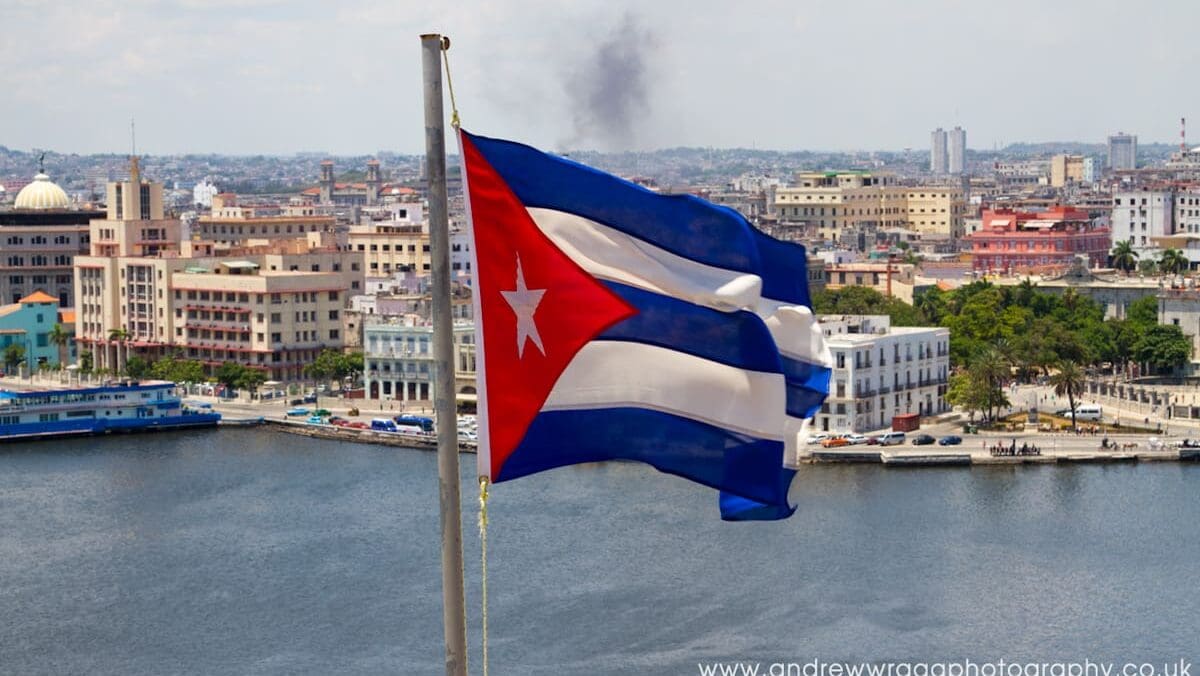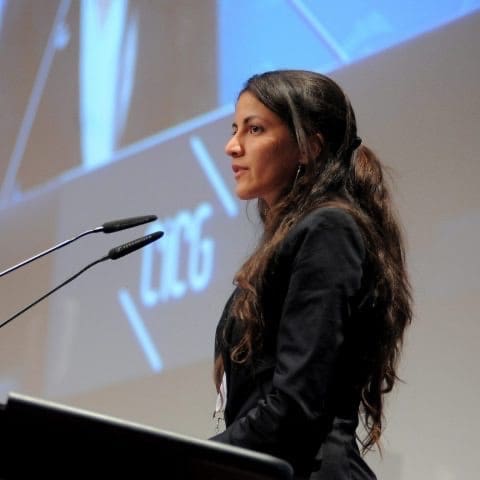
Photo by Andrew Wragg / Flickr, CC BY-NC-ND 2.0

Rosa María Payá is a Cuban activist for freedom and human rights in Cuba. She has a degree in physics from the University of Havana and is a graduate of the Global Competitive Leadership programme at Georgetown University, in Washington, D.C. The daughter of dissident Oswaldo Payá, who died in a traffic accident in 2012 (for which the Inter-American Commission on Human Rights attributed responsibility to Castro’s agents), she is the founder of the Cuba Decide initiative, a citizen initiative that aims to reform Cuba’s political system and rule of law.
I have friends in prison for sharing posts on Facebook, and a 22-year-old girl has just been sentenced for broadcasting one of the protests with her phone. That’s the level of repression we live with in Cuba. There are more than 1,100 political prisoners in Cuba. In a dictatorship, a political prisoner is not just someone who belongs to one party or another; they are people who took to the streets to shout “freedom”; they are social leaders and members of opposition movements; they are artists like the Cuban rapper Maykel Osorbo, who received a Grammy while in prison. Repression in Cuba is the worst in Latin America, and there are more political prisoners in Cuba than the sum of all the countries on the continent, even taking into account countries such as Bolivia, Nicaragua, and Venezuela.
To give you an idea, probably the most important leader of the Cuban opposition, José Daniel Ferrer, has been imprisoned since the summer of 2021 in a rotting isolation cell. Every 3-4 months they allow his wife and daughter to come to the cell door for a couple of minutes and check that he is still alive. Moreover, the constitution of the dictatorship threatens with the death penalty anyone who wants to change the political and economic system of the country: communism and socialism. It is a threat that they carry out, because my father was assassinated along with Harold Cepero, another leader of the Christian Liberation Movement; just as the regime assassinated demonstrators in the streets in the summer of 2021. The repression is brutal and seeks to silence dissent. But despite this, and despite the hunger, people continue to demonstrate in the streets and protests are increasing every year because the economic situation is a disaster and we are on the verge of a failed state. Cubans have not stopped rebelling and there is a general conviction that the only way out of the crisis is to get out of the dictatorship. That has always been the only option.
On the one hand, we have a very powerful propaganda apparatus which, for example, turned a murderer of Cubans, Che Guevara, into an icon of international youth; or a narcissistic egomaniac, Fidel Castro, into an icon of progressivism. Today, these groups control the international media, such as Prensa Latina, which translates the propaganda of the Cuban Communist Party into French, Arabic, or English, and also that of Russia Today, which in this way reaches the European public. This propaganda apparatus is very influential and is combined with the mediocrity of many democratic governments, a mediocrity that has tragic connotations for Cubans and also for Europeans.
Why is Pedro Sánchez receiving Díaz Canel in Brussels when the Cuban president is collaborating with Putin in his aggression against Europe? Why is the EU signing cooperation treaties with Cuba that give hundreds of millions of euros to a regime, when the only thing it manages well is repression? Why does Europe finance a regime that persecutes its people? This is the result of the complicity of politicians like Mr. Borrell, who has facilitated this agreement. The European Parliament has called for its cancellation because of the regime’s lack of respect for human rights, but Borrell continues to support it, even though it is an obvious contradiction to European interests.
It should be remembered that the Cuban regime is Putin’s most important transatlantic ally and, according to data from a year ago, there are at least 3,000 Cubans on the front lines in Ukraine fighting under the Russian flag. The Cuban regime has been an active part of this aggression against Europe not only through its military and propaganda apparatus, but also through its diplomatic influence, which is very large.
There are members of the regime’s military agencies and also civilians, mostly very young, who, in order to escape from misery, have taken this “opportunity” to get a foreign passport—a Russian one. Many of them (and this has been denounced by the international press) arrive in Russia thinking they are going to work in construction, but are tricked and sent to the front. What there is no doubt about is that this is an operation by the dictatorship; no young person of military age could leave the country without the regime’s authorisation. In addition to Cuba’s own declaration of support for the invasion, Díaz Canel blamed Europe and the United States for the war.
The Cuban regime’s strategic-military and political alliance with Putin is evident. The Parliamentary Assembly of the Council of Europe, when it expelled Russia as a terrorist state, pointed to Cuba as a Russian ally in its aggression against Ukraine. What Mr. Borrell is doing is a disgrace to the European Union.
Absolutely, but the connection is more direct and strategic. The Puebla Group is the continuation of the Sao Paulo Forum, which burned out internationally and changed its brand, but not its members. One of the main tasks of the Cuban regime since it came to power was the formation of an intelligence agency. That agency, the G2, was organised with the help of the KGB’s (where Putin comes from) and the Stasi, and today it controls Venezuelan military intelligence. After the fall of the Berlin Wall, Fidel Castro’s way of maintaining his influence was the Sao Paulo Forum that he organised with Lula da Silva, a political platform that included most of the continent’s left-wing forces, both democratic and terrorist. The Sao Paulo Forum and the interference of the Cuban intelligence service, which is infiltrated in all the countries of the region, helped Hugo Chávez to come to power and succeeded in plundering Venezuela’s money.
This is the beginning of the expansion of “21st century socialism,” which aims to place Castro’s allies in power and which is still very active today. It is the approach that has also allowed the infiltration of China, Russia, and Iran into the region. We are not talking about a romanticism, in many cases absurd, of the international Left with Cuba; we are talking about an intelligence apparatus that has been functioning for 60 years, that does not have to give explanations or be accountable to any parliament, and that continues to function despite the disaster and the weakness of the regime on the island. But it is very difficult to defeat repression and its monopoly of violence without an international community committed to the cause, and that is what we Cubans do not have.
Absolutely. The leadership of the intelligence apparatus is the Castro family and a few other generals. Cuba is ruled by an intelligence system; the rest are the civilian faces put on by this military apparatus. And we don’t talk much about Cuban interventionism, but in addition to Angola, the regime intervened in the Yom Kippur War, in South Africa, and in Ethiopia. This has served to exert great influence in many countries.
The problem comes when one asks oneself who is confronting this advance of authoritarianism at the global level, and especially in the Americas. No one is doing it with the same tools as the Cuban regime. The international community, i.e., the remaining democracies in the Americas, the EU, and the United States have it in their hands to become a credible threat to the economic, personal, and criminal interests of the group of military families that control the Cuban regime. It is in their hands to be an element of pressure to accompany the Cuban people’s struggle for freedom.
The Cuban regime uses a method to influence and obtain concessions from the United States. On five occasions, they have created migration crises to destabilise and blackmail the U.S. government. The latest was in November 2021, when the regime made a deal with Daniel Ortega in Nicaragua to remove the VISA restriction for Cubans. Since then at least 400,000 Cubans have crossed the southern border, which would represent 3% of the island’s population. This has become a weapon of pressure that has provoked the U.S. government to act in an absurd way.
There is no private sector in Cuba. There are Cubans who try to survive with very small initiatives outside the regime. And there is a new class of aspiring oligarchs and front men for the military, who are the ones who can import goods from abroad, and who are the means for the regime to circumvent possible sanctions. Many of these front men are repressors of the regime. It is a mediocre emulation of the creation of a Russian-style oligarchy. It is that crude; so it is very sad that the United States, knowing this, makes concessions to the Cuban regime.
Milei has been very clear in his condemnation of Castroism and the Venezuelan and Nicaraguan dictatorships. He has downgraded diplomatic relations with the regime, which is a sign of solidarity with the Cuban people and a gesture of self-protection, because Cuban embassies are nests of intelligence agents. I think Milei is very well oriented and that the other democracies in Latin America would do very well to follow his line as a matter of self-preservation.
Europe must stop financing Castroism and the bilateral agreements must end. There is no doubt in my mind that the best way to break the regime is to stifle its personal and criminal interests, which have nothing to do with the people. The Cuban people are offering, with their struggle in the streets, the opportunity for global democracy to put an end to the head of the totalitarian octopus in Latin America. We, as civil society and opposition, have a viable path from our initiative that is shared by many opposition organisations. It is called Cuba Decide, and it consists of holding a binding plebiscite and initiating a process of transition to democracy.
Our hopes are not pinned on the oppressors of the Cuban people, but at the moment, the oppressors are deciding whether to shoot or imprison the demonstrators. And the element that can make that decision go in the direction of submitting to the people rather than against them is the pressure of the international community on their economic, personal, family, and mafia interests.
